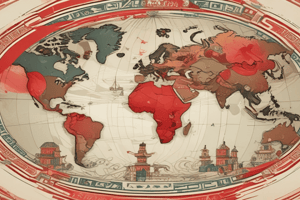Podcast
Questions and Answers
What role did domestic security officials and the military play in the American spy plane incident off Hainan in 2001?
What role did domestic security officials and the military play in the American spy plane incident off Hainan in 2001?
They argued for holding the American crew and trying them in Chinese courts instead of releasing them.
How does the lack of checks and balances in China's political system affect its foreign policy?
How does the lack of checks and balances in China's political system affect its foreign policy?
It may lead leaders to act aggressively internationally to strengthen their domestic position.
What provinces were mentioned as being surveyed for their role in shaping China's foreign policy?
What provinces were mentioned as being surveyed for their role in shaping China's foreign policy?
Guangdong, Shanghai, and Shandong.
What is one potential consequence of leaders lashing out internationally in response to domestic pressures?
What is one potential consequence of leaders lashing out internationally in response to domestic pressures?
In what year did the incident involving the American spy plane and Chinese fighter jet occur?
In what year did the incident involving the American spy plane and Chinese fighter jet occur?
What is the significance of the role of PLA (People's Liberation Army) in the context of domestic security?
What is the significance of the role of PLA (People's Liberation Army) in the context of domestic security?
Why might China's leaders feel compelled to respond assertively in international affairs?
Why might China's leaders feel compelled to respond assertively in international affairs?
How do civil-military relations impact China's approach to military modernization?
How do civil-military relations impact China's approach to military modernization?
What role does private business play in Taiwan's dialogue with China according to the senior official?
What role does private business play in Taiwan's dialogue with China according to the senior official?
How has Jiang Zemin's policies affected the Communist Party's social base?
How has Jiang Zemin's policies affected the Communist Party's social base?
Why is there concern regarding the lack of a political counterweight to nationalistic factions in China?
Why is there concern regarding the lack of a political counterweight to nationalistic factions in China?
What is notable about foreign policymaking in China compared to domestic policymaking?
What is notable about foreign policymaking in China compared to domestic policymaking?
Why might private entrepreneurs lack influence in China's political landscape?
Why might private entrepreneurs lack influence in China's political landscape?
What potential ramifications could the changing social base of the CCP have on China's foreign relations?
What potential ramifications could the changing social base of the CCP have on China's foreign relations?
What concern did a retired PLA general express regarding China's political landscape?
What concern did a retired PLA general express regarding China's political landscape?
How many private businesspeople currently hold a significant position within the CCP according to the information?
How many private businesspeople currently hold a significant position within the CCP according to the information?
What was the impact of Jiang's promotions for his associates on the Politburo Standing Committee?
What was the impact of Jiang's promotions for his associates on the Politburo Standing Committee?
Why did Jiang retain his position in the Central Military Commission despite stepping down from other roles?
Why did Jiang retain his position in the Central Military Commission despite stepping down from other roles?
How did Jiang's eventual retirement affect his influence in the Chinese political landscape?
How did Jiang's eventual retirement affect his influence in the Chinese political landscape?
What concern did the leadership have regarding dual voices during Jiang and Hu's power-sharing period?
What concern did the leadership have regarding dual voices during Jiang and Hu's power-sharing period?
What does the phrase 'Not yet' from Li Zhaoxing suggest about the political atmosphere in China during Jiang's tenure?
What does the phrase 'Not yet' from Li Zhaoxing suggest about the political atmosphere in China during Jiang's tenure?
What role did Jiang's military position play in his influence after his retirement?
What role did Jiang's military position play in his influence after his retirement?
How did Jiang's leadership style contribute to the political dynamics within the Communist Party?
How did Jiang's leadership style contribute to the political dynamics within the Communist Party?
In what way did Jiang's retirement signal changes in China's military strategy?
In what way did Jiang's retirement signal changes in China's military strategy?
How does Xi Jinping's emphasis on stability reflect the ideology of Leninism in the context of the CCP?
How does Xi Jinping's emphasis on stability reflect the ideology of Leninism in the context of the CCP?
In what ways did Beijing characterize the 2014 Hong Kong protests in the context of nationalism?
In what ways did Beijing characterize the 2014 Hong Kong protests in the context of nationalism?
What role does the concept of 'regime security' play in the CCP's response to domestic unrest?
What role does the concept of 'regime security' play in the CCP's response to domestic unrest?
How have the years under Xi Jinping illustrated the relationship between Maoist imagery and current political rhetoric?
How have the years under Xi Jinping illustrated the relationship between Maoist imagery and current political rhetoric?
What is the significance of blaming foreign entities for domestic issues, such as the stock market problems?
What is the significance of blaming foreign entities for domestic issues, such as the stock market problems?
How did Lin Zuoming's statements reflect the challenges to the legitimacy of the CCP's governance?
How did Lin Zuoming's statements reflect the challenges to the legitimacy of the CCP's governance?
What consequences might arise from the growing fear of instability within the CCP?
What consequences might arise from the growing fear of instability within the CCP?
How does the CCP's framing of international economic challenges underscore its narrative of regime stability?
How does the CCP's framing of international economic challenges underscore its narrative of regime stability?
How did Xi Jinping's ideological clampdown relate to the threat of social unrest in China?
How did Xi Jinping's ideological clampdown relate to the threat of social unrest in China?
In what ways did Xi Jinping extend the policies prioritizing political stability that were established under Hu Jintao?
In what ways did Xi Jinping extend the policies prioritizing political stability that were established under Hu Jintao?
What significance does the closing of leftist websites hold in the context of Maoist imagery?
What significance does the closing of leftist websites hold in the context of Maoist imagery?
What role do protests featuring Mao's quotes play in the challenges to regime legitimacy?
What role do protests featuring Mao's quotes play in the challenges to regime legitimacy?
How can Xi's actions toward leftists be interpreted as a response to economic instability?
How can Xi's actions toward leftists be interpreted as a response to economic instability?
Why was Xi Jinping concerned about the legitimacy of the regime in light of the economic changes?
Why was Xi Jinping concerned about the legitimacy of the regime in light of the economic changes?
How did the crackdown on ideological diversity reflect broader challenges within the Chinese Communist Party?
How did the crackdown on ideological diversity reflect broader challenges within the Chinese Communist Party?
What do the actions against radical leftist movements indicate about the trajectory of leftist ideologies in China?
What do the actions against radical leftist movements indicate about the trajectory of leftist ideologies in China?
How does Xiao view the relationship between political participation and regime stability in China?
How does Xiao view the relationship between political participation and regime stability in China?
What are Xi's primary concerns regarding the state of China's political environment?
What are Xi's primary concerns regarding the state of China's political environment?
In what way does neoauthoritarianism factor into China's march toward democratic governance according to Xiao?
In what way does neoauthoritarianism factor into China's march toward democratic governance according to Xiao?
What social tensions does the CCP face as a result of rapid modernization?
What social tensions does the CCP face as a result of rapid modernization?
How does Xiao's view of the CCP as a 'victim of its successes' reflect the party's legitimacy crisis?
How does Xiao's view of the CCP as a 'victim of its successes' reflect the party's legitimacy crisis?
What role does economic performance play in Xi's strategy for maintaining regime stability?
What role does economic performance play in Xi's strategy for maintaining regime stability?
What societal consequences does China face from its rapid modernization?
What societal consequences does China face from its rapid modernization?
How does the idea of 'soft landing' relate to Xiao's perspective on political reform in China?
How does the idea of 'soft landing' relate to Xiao's perspective on political reform in China?
Flashcards are hidden until you start studying
Study Notes
Private Business Role in China's Foreign Policy
- Private business executives met with a senior Taiwanese official to urge dialogue with Taiwan.
- Private business leaders argue that the uncertainty in the Taiwan Strait is hindering their business.
- Private businesses lack a formal political voice, despite efforts by Jiang Zemin to bring them into the Communist Party.
- Only one private businessperson serves as an alternate member of the CCP Central Committee.
Nationalist Forces and Foreign Policy
- A retired PLA general worries about the lack of political counterweight to the nationalist factions in government.
- Nationalist public, military, and intelligence agencies may push China towards military action.
Domestic Policy vs. Foreign Policy
- Foreign policymaking is more centralized and less transparent than domestic policymaking.
- Domestic policy has clear and measurable outcomes, while foreign policy results are harder to assess.
Checks and Balances in the Chinese System
- China's system lacks effective checks and balances, leading to potential for aggressive foreign policy moves for domestic gain.
- The 'Control Cartel', consisting of powerful security officials, often takes a hard line on foreign relations with Japan, Taiwan, and the US.
- The Control Cartel's influence was seen in the 2001 Hainan Island incident, where they argued to keep the American crew detained.
Weak Voices for International Cooperation
- Interviews with officials in Guangdong, Shanghai, and Shandong suggest that provinces lack influence over foreign policy, despite their role in economic policymaking.
- Local governments struggle to assert influence in foreign policy, highlighting the centralized power structure.
Jiang Zemin and the Central Military Commission
- Jiang Zemin secured promotions for officials associated with him into the Politburo Standing Committee, maintaining his influence.
- Jiang managed to retain his position as head of the Central Military Commission despite reaching the retirement age of 70.
- Jiang lost influence after stepping down from his top Party post in 2004.
Dual Leadership and the 1989 Demonstrations
- During the period when Jiang and Hu Jintao shared power, there was unease among subordinate officials.
- The last instance of conflicting voices from China's leadership led to the near-disaster of the 1989 Tiananmen Square demonstrations.
Xi Jinping and Neoauthoritarianism
- Xi Jinping, Chinese leader, believes in a reformist approach to achieve prosperity and democracy while maintaining political stability.
- He sees neoauthoritarianism as necessary to avoid disaster during China's transition to democratic modes and orders.
- Xi's main concern is political stability due to deep-seated discontent and resentment towards the communist party-state.
- Issues Xi is addressing include pollution, corruption, income inequality, and social tensions.
- Economic downturn and slowing growth during Xi's tenure fueled his belief in "stability overrides everything" policy, aimed at nipping any instability in the bud.
- Xi views Western influence as a threat to stability, blaming "external forces" for unrest in Hong Kong and the 2015 Chinese stock market slump.
- This discourse of external threat emphasizes the importance of national security, which is seen as synonymous with regime security.
- Xi's crackdown on political activists, dissidents, and human rights advocates is a measure to reduce the risk of regime instability.
- He sees those left behind by rapid economic change (and the potential for unrest) as a threat to regime legitimacy.
- Xi's ideological crackdown targets both liberals and radical leftists, silencing websites and voices that challenge the CCP's authority.
- This ideological crackdown reflects an intensification of the Hu Jintao era's focus on political stability.
Studying That Suits You
Use AI to generate personalized quizzes and flashcards to suit your learning preferences.




